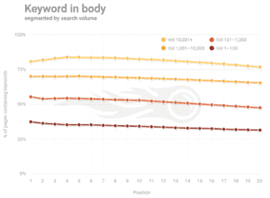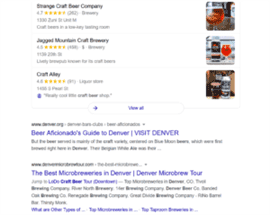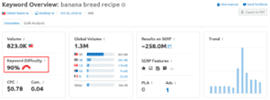Every SEO practitioner knows keywords are important, but the nebulous nature of search engine algorithms has made it possible for keyword myths to run rampant. From misconceptions about search volume to mix-ups around keyword research, there are plenty of confusing rumors making it difficult to know what’s really going on.
Want to learn the truth about keywords and maximize your rankings? Get ready to bust some myths:
- 1. Keywords Aren’t as Important as Links
- 2. Only Keywords with High Search Volumes Are Worth Targeting
- 3. Long-Tail Keywords Are Easy to Rank For
- 4. Anchor Text Doesn’t Matter
- 5. URLs Don’t Need Keywords
- 6. Meta Description Keywords Don’t Affect Rankings
- 7. Keyword Research Is Optional
1. Keywords Aren’t as Important as Links
Yes, it’s true—the whole reason Google’s algorithm was so groundbreaking upon its mid-1990s release was that it broke from the norm by focusing on links and keywords rather than keywords alone.
As a result, links of all types—whether from social media posts, other websites or internal pages—have become crucial to SEO success. Yet it’s imperative for SEO practitioners to remember that just because keywords aren’t the only ranking factor doesn’t mean they’re not vitally important.
In fact, Google’s own explanation of its search algorithm states that after determining the meaning of the user’s query, the next step is to assess page relevance. In Google’s words:
The most basic signal that information is relevant is when a webpage contains the same keywords as your search query. If those keywords appear on the page, or if they appear in the headings or body of the text, the information is more likely to be relevant.
After analyzing a page’s keywords, Google, of course, uses highly sophisticated machine learning techniques to provide users with the best possible results. Nonetheless, keywords remain one of the most integral parts of the ranking process.
For proof, turn to Semrush’s ranking factors study. There, an analysis of 600,000 search queries found that among the 20 top-ranking pages for any given query, over 75 percent have high-volume keywords in their body content:
In the same vein, more than 60 percent had high-volume keywords in their title and over 45 percent had them in their metadata. Most importantly, the higher-ranking the page, the more on-page keywords they had, including both high- and low-volume keywords alike.
So if you’ve been ignoring keyword optimization in favor of a purely link-based strategy, you’d be wise to give keywords some well-deserved attention.
2. Only Keywords with High Search Volumes Are Worth Targeting
As the Semrush study showed, high-ranking pages tend to include plenty of high-volume keywords. This doesn’t mean that you should target high-volume keywords exclusively, though.
Generally speaking, the highest-volume keywords are the most difficult to rank for—for instance, if you’re only targeting the high-volume keyword beer, you’ll be going up against giants like Wikipedia and Budweiser. But if you also target the lower-volume key phrase craft beer denver, you’ll be competing with comparatively small local breweries and publications:
The lesson isn’t that low-volume keywords are better than their high-volume counterparts or vice versa. Rather, it’s that you should be optimizing for both and find a balance that works for you.
3. Long-Tail Keywords Are Easy to Rank For
It’s true that long-tail keywords (i.e. keywords that are longer, more specific and less common) tend to be easier to rank for than short-tail ones (i.e. those that are brief, broad and relatively common). Nevertheless, it’s crucial to remember that’s not always the case.
For example, Semrush’s Keyword Magic Tool showed that while the keyword bread has a U.S. volume of 201,000, the long-tail key phrase banana bread recipe is more than four times as popular with a U.S. search volume of 823,000 as of October 2020.
As such, bread has a difficulty rating of 86 percent (with 100 being the most difficult), while the longer banana bread recipe has an even higher difficulty rating of 90 percent:
In short, it’s essential to do your due diligence and conduct some keyword research before assuming that any long-tail keyword will be easier to rank for than a shorter one.
4. Anchor Text Doesn’t Matter
The original Stanford University paper outlining the principles of Google’s algorithm states that “Google makes use of both link structure and anchor text.” It’s able to do so because “the text of links is treated in a special way in [their] search engine. Most search engines associate the text of a link with the page that the link is on,” but they “associate it with the page the link points to.”
In simpler terms, anchor text is a fundamental part of Google’s core algorithm and directly impacts the ranking of the page it links to.
And yet, doubts surrounding the strength of anchor text as a ranking factor have ebbed and flowed for years—in 2012, Moz co-founder and SEO expert Rand Fishkin theorized that anchor text was weakening and would someday be replaced entirely. That didn’t happen, and Google Webmaster Trends Analyst John Mueller confirmed as much in a 2017 tweet:
Yes, but anchor text (and image alt text) helps us quite a bit in understanding context, so I wouldn’t leave it out if you can avoid it.
— 🍌 John 🍌 (@JohnMu) May 15, 2017
If you’re still not convinced, consider Google’s own recommendation from its developer documentation style guide:
When you’re writing link text, use a phrase that describes what the reader will see after following the link.
So when you’re creating anchor text for internal links, always be descriptive (no click here links allowed!) and use the primary keyword of the page you’re linking to whenever possible.
5. URLs Don’t Need Keywords
After spending a sizable chunk of your time figuring out how to incorporate the right keywords within a site’s content, it’s easy to view URL keyword optimization as insignificant. But if you do, you’ll be missing a quick and easy opportunity to improve rankings.
To take advantage of that opportunity, include one or two keywords in each page’s URL whenever possible. Only add them where it sounds natural, though. For example, the URL https://www.example.com/recipes/vanilla-ice-cream sounds natural and makes logical sense, but the URL https://www.example.com/recipes/best-vanilla-ice-cream-dessert-recipe-sweets-desserts-food-gourmet does not.
If you can’t work in keywords without making the URL sound awkward or spammy, just be sure to use words and keep it as short as possible. As Google explains in its SEO Starter Guide, “URLs with words that are relevant to your site’s content and structure are friendlier for visitors navigating your site.” As such, try to steer clear of:
- overlong URLs with extraneous parameters and session IDs; and
- generic page names such as blog1, blog2 and so on.
6. Meta Description Keywords Don’t Affect Rankings
It’s true that Google won’t rank a page based on the content of its meta description.
Nonetheless, a great meta description can indirectly boost rankings by giving users an accurate and detailed idea of the page’s content, and including a keyword or two can help accomplish that.
If Google uses the meta description you write, it will show up as a snippet under the page’s title in search results:
A study by Ahrefs found that Google does indeed use manually created meta descriptions to form search results snippets almost 40 percent of the time, so there’s a fair chance your meta description will affect whether users click on the page you’re optimizing or move on to the next.
To ensure users get a clear idea of a page’s content, always create a detailed meta description and include the primary keyword when possible.
7. Keyword Research Is Optional
It seems logical that the topic of any page will naturally form its most important keywords. If you’re optimizing a page about holiday decor, the primary key phrase should be holiday decor, right?
Not necessarily—people don’t always search for a single topic, and will often modify simple search terms to find exactly what they’re looking for. That’s where keyword research comes in: With a comprehensive keyword research tool, you can find out what search engine users are really searching for, and the results may surprise you.
In the case of your hypothetical page about holiday decor, a quick search for holiday decor on Semrush’s Keyword Magic Tools reveals that the phrase holiday & seasonal decor has a higher search volume, while the phrase christmas & holiday decor has the same volume:
You’ll also be able to get ideas for other lower-volume keywords to target, some of which may have a lower difficulty rating than their higher-volume counterparts.
You don’t need a paid tool to conduct effective keyword research either. Some widely used free options include:
Keyword Myths? Busted. Rankings? Up.
Common keyword myths and assumptions can make it difficult for any SEO practitioner (but especially beginners) to develop a successful keyword strategy.
But once you know the truth about keywords and how search engines use them, you can start targeting the right keywords, making more informed decisions, and achieving higher rankings.
Image credits
Semrush / November 2017
Screenshots by author / October 2020














